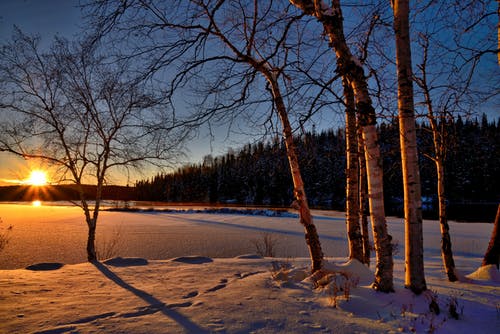Of tribulation these are they
Denoted by the white;
The spangled gowns, a lesser rank
Of victors designate.All these did conquer; but the ones
Who overcame most times
Wear nothing commoner than snow,
No ornament but palms.Surrender is a sort unknown
On this superior soil;
Defeat, an outgrown anguish,
Remembered as the mileOur panting ankle barely gained
~Emily Dickinson
When night devoured the road;
But we stood whispering in the house,
And all we said was “Saved!”

More death. Dickinson must have spent a lot of time thinking about it–so much time that she has a variety of different reactions and attitudes toward it. Sometimes it’s a suitor, welcome, chivalrous. Sometimes it’s an adversary. Sometimes it is longed for as relief from suffering, while other times the act of dying is itself the supreme trial.
There’s a lot of interesting, evocative, and tricksy language in this poem. In the first stanza, those who wear white are the ones who have overcome (or at least endured) tribulation. A lesser rank, presumably of the dead, wear “spangled gowns.” The contrast is interesting–those who are higher wear plain white, while those who are “lesser” are more elaborately adorned. The “lesser” are, however, still “victors.” All here have triumphed.
All of them, she goes on to elaborate in the second stanza, have been victorious, but those in white “overcame most times.” Their reward? Their only ornaments are palms, and the color of their raiment is “nothing commoner than snow.” Dickinson’s use of “commoner” suggests that snow is not common–they don’t wear anything commoner than this. At the same time, snow is fairly common, we know–certainly in New England. So there’s a paradoxical turn of phrase here, which perhaps is meant to underscore the paradox of the highest being clothed the most simply. Heaven, after all, is an upside-down kingdom where the last shall be first.
On the “superior soil” of heaven, surrender is unknown, and defeat is merely a memory, like the reminiscence of the last mile of a particularly difficult night journey.
The final stanza brings us out of heaven and back to Earth, back into a mortal, living perspective. Dickinson shifts from the white-clothed and bespangled victors to those they left behind: “But we stood whispering in the house, / And all we said was ‘Saved!'” That is all the living can say, all they can know. They can only guess at the rank and raiment of the deceased in heaven.
This, of course, begs the question–how can the speaker know? She identifies herself in the last stanza with personal pronouns as one of the “we,” one of the living left behind. Yet she is informing us about the status of the dead and saved. More paradox. So I’m left not entirely sure of exactly what she’s getting at, and once again wondering if I’m a bit dull, or if perhaps this was precisely the effect Dickinson was going for.








